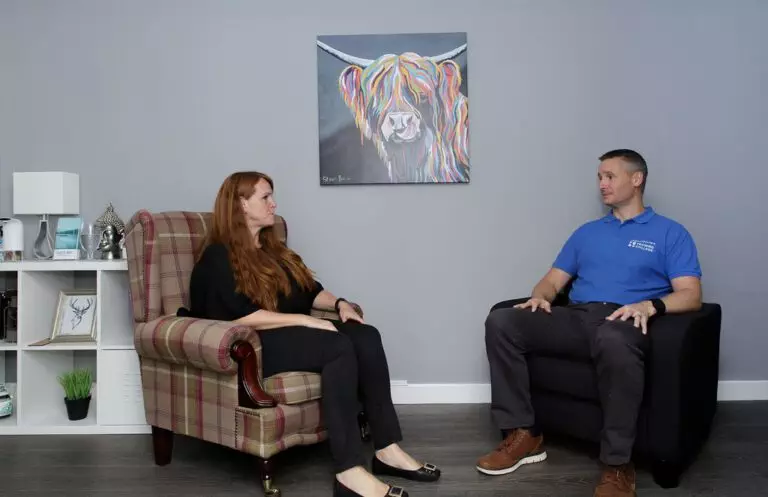Depression is the most common mental health condition across the world, followed by anxiety. Almost 20% of people aged 16 and over in the UK have showed symptoms of anxiety and depression, according to the Mental Health Foundation. But what is depression? And how can Piece of Mind Hypnotherapy rid you of your depressive symptoms? Read on to discover how hypnotherapy can see you living the life you dream of.

What is depression?
Sounds obvious, right? So often, depression is underestimated but having depression isn’t the same as feeling down in the dumps for a couple of days. Depression is a low mood that lasts for a long time or keeps returning and is catagorised as having a significant impact on everyday life. Symptoms of depression vary from person to person but can include both psychological and physical symptoms, including:
- Continual sadness or low mood
- Feelings of being hopeless or helpless
- Having low self-esteem
- Feeling anxious and worried
- Being intolerant or irritable
- Having no motivation, even towards things you used to enjoy
- Experiencing suicidal thoughts or thoughts of harming yourself
- Changes in appetite
- Lack of energy
- Disturbed sleep/need to sleep too much
- Moving and speaking more slowly
- Changes in sex drive
- Unexplained aches and pains
Doctors tend to describe depression by severity: Mild depression (some impact on life); Moderate depression (significant impact on life); Severe depression (making it almost impossible to live life).
What causes depression?
Depression can occur for a wide range of reasons with a variety of triggers which are as individual as the person living with the condition. Stressful life events (like losing a loved one, a breakdown of a relationship, money problems and ongoing health issues) may cause depression alone or causes may build up until depression is triggered by feelings of overwhelm. A “downward spiral” is often described by sufferers and their doctors – You may suffer a bereavement and during your period of grief, you may struggle to keep up with work commitments, adding additional stress. These events added together can trigger your depression.

Some personalities are more vulnerable to depression, for example, a person with low self-esteem may be more likely to develop feelings of hopelessness and low mood. Family history is also considered to affect whether a person will develop depression. Giving birth, loneliness, alcohol/drug use or life-threatening illness are all known to trigger depression, although that’s not to say that everyone facing these experiences will become depressed.
How is depression diagnosed?
You, or those around you, are likely to have suspicions that you’re suffering from depression before you get an official diagnosis. If you’re unsure if what you’re feeling is depression, you may like to take a self-assessment, which is available on the NHS website. Self-assessment should never replace a consultation with your GP, however. The only way to receive an official diagnosis of depression is to discuss your symptoms with a doctor.
How is depression treated?
Typically, your GP will follow a treatment route whereby self-help is recommended initially, and counselling or CBT (cognitive behavioural therapy) are offered if no improvements are seen. The waiting list for talking therapy through the NHS can be a long one, however, and many depression sufferers find the wait for treatment to be anxiety-inducing. Your GP may also offer you anti-depressants, although the side effects can be too much to handle for some. In severe cases that don’t respond to combinations of antidepressant medication, brain stimulation techniques (such as electroconvulsive therapy or ECT) may be used.
But, how does hypnotherapy treat depression?
Hypnotherapy offers depression sufferers the opportunity to rid themselves of their plaguing symptoms. Hypnotherapy works because it targets the underlying cause of the depression, as opposed to just treating the symptoms like medication does. By identifying the depressive trigger, hypnotherapy works to support your brain to move on from the “unfinished business” that has seen you develop negative thoughts and behaviour patterns in order to cope. You can safely and calmly reevaluate your traumatic memories or negative emotions, allowing you to release the unwanted depression that has been triggered.
During hypnotherapy, in a deeply relaxed state, positive suggestions can be made to replace the negative thought processes that have taken root in your brain. These positive suggestions can help to improve your sleep patterns, lessen your desire to smoke or drink and help you to feel like the you you’ve been missing.
To learn more about hypnotherapy, discover the most common myths and misconceptions of the relaxing, safe and effective depression treatment.
About Piece of Mind Hypnotherapy
Piece of Mind Hypnotherapy is owned and managed by me, Andy Griffiths. Having suffered from mental illness many years ago, I know the feelings of utter despair fellow sufferers live with. My behaviours and thoughts that occurred as a result of mental illness made me feel like I was just surviving, not living a life I craved. Hypnotherapy gave me my life back – This is why I created Piece of Mind Hypnotherapy, to help others like me.
Seeing the impact my therapy made on clients encouraged me to develop Piece of Mind Hypnotherapy Training, where my accredited and approved diploma and certificates in Hypnotherapy have been awarded to over 150 students. Through therapy and training, I aim to support those suffering with mental illness to live the life they have dreamt of, free from the constraints of their conditions.
Piece of Mind Hypnotherapy is based in Glasgow and I work from my bespoke therapy and training centre as well as offering hypnotherapy and anxiety therapies online to clients across the globe.
Contact Me
Contact Piece of Mind today:
0141 340 9870

7.Drink responsibly
Whether your festive beverage is a Baileys or a Buck’s Fizz, try to drink responsibly. Getting drunk might be fun, but the morning after never is. Avoid the hangover (and the family arguments about who ate the last Malteser Celebration) to avoid unnecessary anxieties.
8.Live in the moment and ENJOY YOURSELF
Anxiety can take away all feelings of joy. It’s easier said than done, but try to enjoy yourself whenever you can and remember… It’ll all be over soon!
Christmas might be the most wonderful time of the year for some, but living with anxiety only becomes harder when you’re faced with festive pressures. At Piece of Mind, our diaries remain open throughout December, with hypnotherapy available to help you live the anxiety-free life you deserve and not only for Christmas, but for the rest of your life.
Merry Christmas and a Happy New Year
Facebook
Twitter
Youtube
Instagram
Depression and Hypnotherapy – Living Life to the Fullest
Depression is the most common mental health condition across the…
EPISODE THIRTEEN
EPISODE Thirteen: The Emotional Toll of Hair Loss That Nobody…
EPISODE TWELVE
EPISODE Twelve: Feeling Empty. What it Means and What to…
Hypnotherapy – Debunking the Myths and Misconceptions
Think about films or TV programmes you’ve seen that feature…
